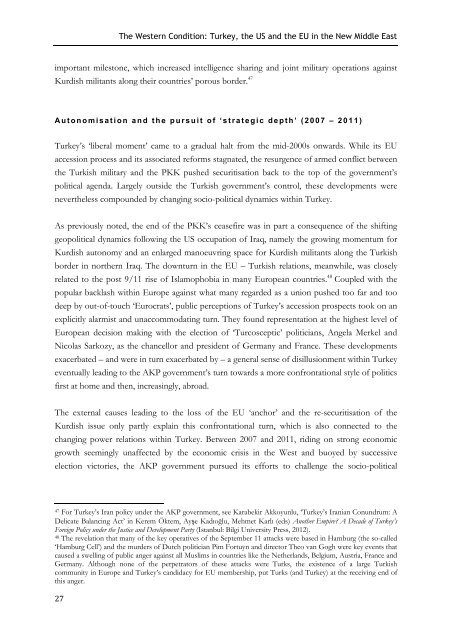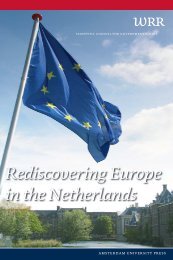The Western Condition - St Antony's College - University of Oxford
The Western Condition - St Antony's College - University of Oxford
The Western Condition - St Antony's College - University of Oxford
Create successful ePaper yourself
Turn your PDF publications into a flip-book with our unique Google optimized e-Paper software.
<strong>The</strong> <strong>Western</strong> <strong>Condition</strong>: Turkey, the US and the EU in the New Middle East<br />
important milestone, which increased intelligence sharing and joint military operations against<br />
Kurdish militants along their countries’ porous border. 47<br />
Autonomisation and the pursuit <strong>of</strong> ‘strategic depth’ (2007 – 2011)<br />
Turkey’s ‘liberal moment’ came to a gradual halt from the mid-2000s onwards. While its EU<br />
accession process and its associated reforms stagnated, the resurgence <strong>of</strong> armed conflict between<br />
the Turkish military and the PKK pushed securitisation back to the top <strong>of</strong> the government’s<br />
political agenda. Largely outside the Turkish government’s control, these developments were<br />
nevertheless compounded by changing socio-political dynamics within Turkey.<br />
As previously noted, the end <strong>of</strong> the PKK’s ceasefire was in part a consequence <strong>of</strong> the shifting<br />
geopolitical dynamics following the US occupation <strong>of</strong> Iraq, namely the growing momentum for<br />
Kurdish autonomy and an enlarged manoeuvring space for Kurdish militants along the Turkish<br />
border in northern Iraq. <strong>The</strong> downturn in the EU – Turkish relations, meanwhile, was closely<br />
related to the post 9/11 rise <strong>of</strong> Islamophobia in many European countries. 48 Coupled with the<br />
popular backlash within Europe against what many regarded as a union pushed too far and too<br />
deep by out-<strong>of</strong>-touch ‘Eurocrats’, public perceptions <strong>of</strong> Turkey’s accession prospects took on an<br />
explicitly alarmist and unaccommodating turn. <strong>The</strong>y found representation at the highest level <strong>of</strong><br />
European decision making with the election <strong>of</strong> ‘Turcosceptic’ politicians, Angela Merkel and<br />
Nicolas Sarkozy, as the chancellor and president <strong>of</strong> Germany and France. <strong>The</strong>se developments<br />
exacerbated – and were in turn exacerbated by – a general sense <strong>of</strong> disillusionment within Turkey<br />
eventually leading to the AKP government’s turn towards a more confrontational style <strong>of</strong> politics<br />
first at home and then, increasingly, abroad.<br />
<strong>The</strong> external causes leading to the loss <strong>of</strong> the EU ‘anchor’ and the re-securitisation <strong>of</strong> the<br />
Kurdish issue only partly explain this confrontational turn, which is also connected to the<br />
changing power relations within Turkey. Between 2007 and 2011, riding on strong economic<br />
growth seemingly unaffected by the economic crisis in the West and buoyed by successive<br />
election victories, the AKP government pursued its efforts to challenge the socio-political<br />
47 For Turkey’s Iran policy under the AKP government, see Karabekir Akkoyunlu, ‘Turkey’s Iranian Conundrum: A<br />
Delicate Balancing Act’ in Kerem Öktem, Ayşe Kadıoğlu, Mehmet Karlı (eds) Another Empire? A Decade <strong>of</strong> Turkey’s<br />
Foreign Policy under the Justice and Development Party (Istanbul: Bilgi <strong>University</strong> Press, 2012).<br />
48 <strong>The</strong> revelation that many <strong>of</strong> the key operatives <strong>of</strong> the September 11 attacks were based in Hamburg (the so-called<br />
‘Hamburg Cell’) and the murders <strong>of</strong> Dutch politician Pim Fortuyn and director <strong>The</strong>o van Gogh were key events that<br />
caused a swelling <strong>of</strong> public anger against all Muslims in countries like the Netherlands, Belgium, Austria, France and<br />
Germany. Although none <strong>of</strong> the perpetrators <strong>of</strong> these attacks were Turks, the existence <strong>of</strong> a large Turkish<br />
community in Europe and Turkey’s candidacy for EU membership, put Turks (and Turkey) at the receiving end <strong>of</strong><br />
this anger.<br />
27

















